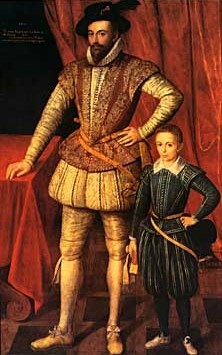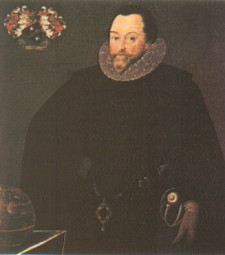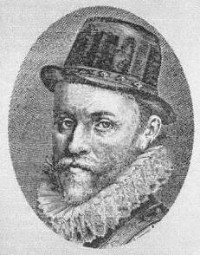|
Raleigh's
trial was inevitably a turning-point in
the lives of the two principal protagonists
- Sir Walter Raleigh and Sir Edward Coke.
Although both aged 51, the trial marked
the end of the career which made Raleigh
famous, and the beginning of the career
which made Coke famous. Coke, it is true,
had some prominence in public affairs prior
to Raleigh's trial, especially when he led
the prosecution of Essex; but nothing prior
to 1603 would have generated for him more
than a footnote in any history of the period.
Raleigh survived 15 years after the trial,
most of that time as a prisoner in the Tower,
though he was released in 1616 to lead an
expedition to Guiana, and his most important
writings (especially his History of the
World) date from the period of his imprisonment.
But the things for which he is chiefly remembered
all lay in his past.
History
provides several similar examples of a confrontation
between two near-contemporaries, where the
outcome has practically ended one famous
career, but created another. Napoleon Bonaparte
and the Duke of Wellington were born less
than three months apart, yet Bonaparte's
defeat by Wellington at Waterloo ended the
former's life of prominence, whilst making
the latter a celebrity. The same may be
said of Oscar Wilde and Lord Carson, who
had studied together at Trinity College,
Dublin.
Raleigh's
sea-faring contemporaries:
Sir Francis
Drake; Sir John Hawkins; and Sir Humphrey
Gilbert
Raleigh,
at 51, had led a life of action and adventure,
of conquest and of colonisation, of battles
by land and by sea and in the thick of political
intrigues at Elizabeth's court, unparalleled
in English history. He amassed, not one
fortune, but several - and lost each of
them, as quickly, and almost as cheerfully,
as they had been gained. He accumulated
large holdings of property, including one
of the grandest houses in London and an
even grander country seat, and a large private
fleet of armed warships; but, again and
again, he hazarded everything on speculative
ventures in the Americas.
Raleigh
occupied a prodigious number and variety
of public offices, some of them mere sinecures,
but many involving onerous responsibilities
which he discharged with great efficiency
and success. He was Captain of the Queen's
Guard, Warden of the Stanneries (the tin
mines in Devon and Cornwall), Lord Lieutenant
of Cornwall, Vice-Admiral of the West, and
Governor of Jersey. In addition, he controlled
Crown monopolies in wines and exports of
cloth - lucrative positions, but also ones
requiring considerable administrative talent.

Raleigh
and his eldest son, Wat, at about the time
of the trial
Raleigh
first saw action at 15, fighting with the
Huguenots in France. At 26, he captained
a vessel of his half-brother, Sir Humphrey
Gilbert, in a voyage of exploration and
privateering in the West Indies. At 28,
he was sent by Elizabeth to command troops
in Ireland, and took part in the savage
defeat of an attempted Spanish invasion.
Having been granted a royal charter to establish
a colony in Virginia, he made three expeditions
to North America, establishing the first
English settlement on that continent. In
England, he was instrumental in uncovering
the Babington Plot against Elizabeth by
supporters of Mary, Queen of Scots. In 1588,
England was threatened by the Great Armada
of Spain, the largest fleet ever assembled
in Europe, and Raleigh was given responsibility
for the defence of the channel ports; after
the Armada was defeated, he led a reprisal
raid at Cadiz. His last great adventure
was the search for El Dorado, the legendary
gold mines of Guiana; Raleigh led two expeditions
to the Caribbean coast of South America,
in 1594, and again (following his imprisonment)
in 1617 at the age of 65. Raleigh was not,
however, merely a man of action; he was
also an accomplished writer and poet. He
studied at Oriel College, Oxford, and was
also enrolled at the Middle Temple (where
he was a contemporary of Coke at the Inner
Temple), but it does not appear that Raleigh
had any interest in studying law. He wrote
widely on matters historical, nautical,
geographical and military; and his "serious"
writings were amongst the most widely-read
and best of his time. And he was also a
noted poet. One story has Raleigh writing
in a glass window, "Fain would I climb,
yet fear I to fall"; Queen Elizabeth,
"either espying or being shown it,
did under-write, 'If thy heart fails thee,
climb not at all'." Two couplets are
worthy of particular mention, as having
an added poignancy given the circumstances
of Raleigh's life and career.
As
a young man, Raleigh penned the lines:
The
night before his execution, he wrote:
Cowards
fear to die; but courage stout,
Rather
than live in snuff, will be put out.
|




